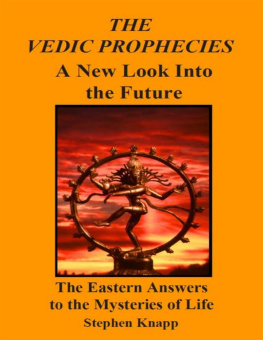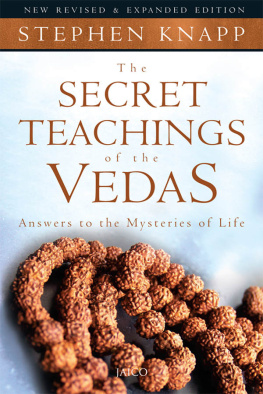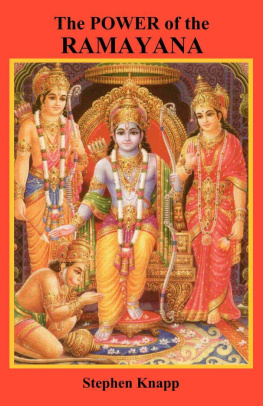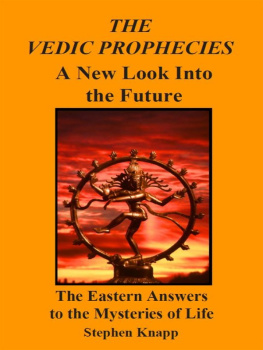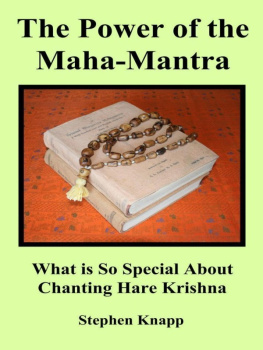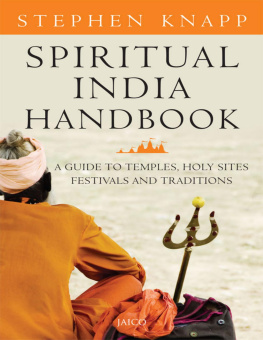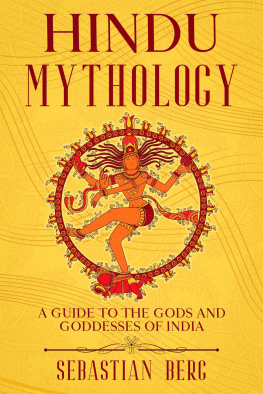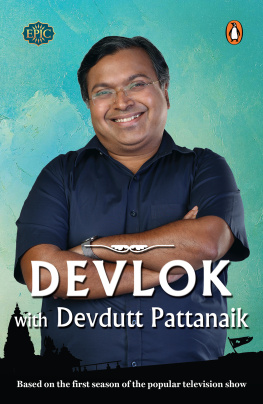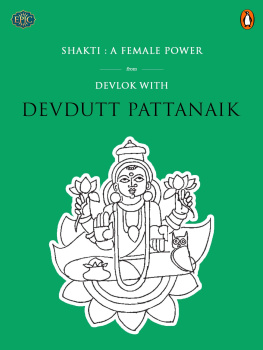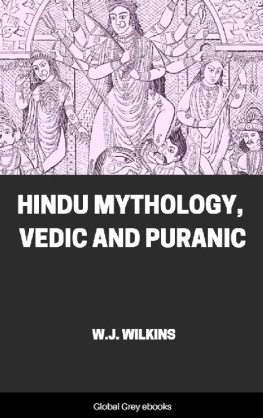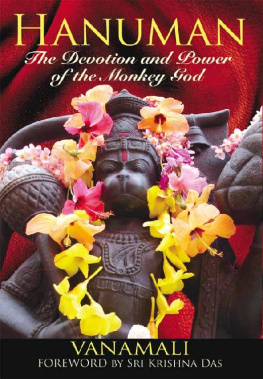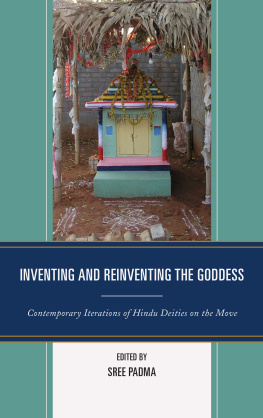

Published by Jaico Publishing House
A-2 Jash Chambers, 7-A Sir Phirozshah Mehta Road
Fort, Mumbai - 400 001
www.jaicobooks.com
Stephen Knapp
Published in arrangement with
Stephen Knapp
180 Lenox Street
Detroit, Michigan
48215, USA
HINDU GODS & GODDESSES
ISBN 978-81-8495-366-4
First Jaico Impression: 2012
Second Jaico Impression: 2014
No part of this book may be reproduced or utilized in any form or by any means, electronic or mechanical including photocopying, recording or by any information storage and retrieval system, without permission in writing from the publishers.
Contents
WHY SO MANY GODS?
SRI KRISHNA
THE AVATARS OF LORD KRISHNA
LORD VISHNU
LORD BRAHMA
THE IDENTITY OF LORD SHIVA AND GODDESS DURGA
THE GODDESSES
GANESH AND MURUGAN
THE REMAINING DEMIGODS
SRI CAITANYA MAHAPRABHU THE MOST RECENT AVATAR
THE SIGNIFICANCE OF DEITIES AND DEITY WORSHIP
DEITY WORSHIP FROM THOUSANDS OF YEARS AGO
Introduction
The reason why I decided to write this book was because of a series of incidents that happened to convince me of the need for such abook. First, I was approached more than once by people who wanted abook that explained all about the Divinities of Vedic culture. They askedif I knew of a good book that would answer all of their questions. Well,of course, I knew of some, but they were the books I had gotten while inIndia. Or there were a few others that were large photographic books,and a little out of the budget of most people. So, such books were not soreadily available.
Then I gave a lecture and presentation to an interfaith groupabout how the Divine appears through Vedic art and in the deities in thetemples, and explained the various personalities in the Vedic pantheon.These were people of all faiths, and many came up to me afterwards toexpressed how much they liked the presentation, how they felt drawn tothe various Vedic Divinities, and if I had anything more on that topic.Obviously, a book such as this one would have been most appropriate tofurther their knowledge about the topic I had spoken.So, what to do? Obviously, a book should be written in a mannerto make the information easily understood, and published in a way andpriced so that it can be easily available. That is how I decided to presenta book that focused on this topic.
Plus, it was to show that there are reasons for the variousDivinities, and that it is not so complicated to understand when it is putinto proper perspective. This is a complaint that is sometimes heard fromthose who are not familiar with Vedic culture: Why are there so manygods? They do not understand that actually there is only one God. Andby understanding the Vedic Divinities appropriately, that becomes clear.This book will do that.
CHAPTER ONE
Why So Many Gods?
The four primary Vedas, namely the Rig, Sama, Atharva and Yajur Vedas, represent the accomplishment of a highly developed religious system. The primary function and goal of these four Vedas was to encourage satisfaction of material desires through worship of the demigods, or those Divinities called the Vedic gods. Therefore, the Vedas contain many directions for properly performing the necessary worship and particular sacrifices or rituals in worship to these devas (demigods) to get the blessings that would help increase one's power and position, or for reaching the heavens in one's future, or other goals.
The point is that the devas affect or assist in all levels of universal management and activities, including the weather, or who is bestowed with particular opulences such as riches, beautiful wife or husband, large family, good health, etc. For example, one could worship Agni for getting power, Durgadevi for good fortune, Indra for good sex life or plenty of rain, or the Vasus for getting money. Such instruction is in the karma-kanda section of the Vedas which many people considered to be the most important part of Vedic knowledge. But this is for helping people acquire the facilities for living a basic material existence. There are, of course, various actions, or karmas, prompted by our desires to achieve certain results. This is the karma-kanda section of the Vedas. However, this is not the complete understanding of the karma-kanda segment, which is meant to supply the rituals for purifying our mind and actions while in the pursuit of our desires, and not to limit ourselves merely to live with the intent of acquiring all of one's material wants and necessities from the demigods. By having faith and steadiness in the performance of the ritual, one establishes purification in one's habits and thoughts. This provides a gradual process of acquiring one's needs and working out one's desires while simultaneously becoming purified and free of them. Such purification of our consciousness can then bring one to a higher level of spiritual activity. This was the higher purpose of the karma-kanda rituals. Without this understanding, one misses the point and remains attached to rituals in the pursuit of material desires, which will drag one further into material existence.
Therefore, as different Vedic literature was compiled and presented, the goal of such texts changed from focusing on rituals and prayers and became more directed toward understanding one's spiritual identity and relationship with the Supreme. These included such texts as the Upanishads, and then on to the Mahabharata and Bhagavad-gita, and further to include the Puranas and other texts, to name a few. Thus, such Vedic shastra or spiritual books elaborated on the spiritual truths in the Vedas and also emphasized different Gods, such as Vishnu or Krishna, who were the Divinities who could bring one to a higher spiritual consciousness and help one attain moksha or complete liberation from material existence. The other demigods cannot provide for such liberation. Thus, the whole library of Vedic texts includes information on all levels of spiritual understanding, the heights of which direct a person to become free from the desires for material facilities, or the need to worship the demigods for such blessings, and for attaining entrance into the spiritual domain, which is the highest of all spiritual goals.
TWO WAYS TO VIEW THE VEDIC DIVINITIES
There are generally two ways that followers of the Vedic tradition view the Vedic Divinities. For some, who are swayed toward the impersonalist view, they feel that the Supreme is not a being but an impersonal force from which everything is created, like the great Brahman effulgence. They usually feel that all of the Vedic Divinities are but different forms or representations of the same Supreme or Absolute Truth. Thus, it does not matter whether a person worships Shiva, Krishna, Ganesh, Murugan, or any other of the Vedic gods or goddesses, because they all represent the same Absolute Truth or God in various forms. This is true with the avatars of Lord Krishna, but there are differences with the other devas, which will become clear as we go through this book.
On the other hand, there are those who feel that the Absolute Truth is, indeed, ultimately a personality. They hold the view that it does make a difference in which of the Vedic Divinities you worship, because they offer varying blessings and results from such worship. So, each one has a specific purpose.
Next page

